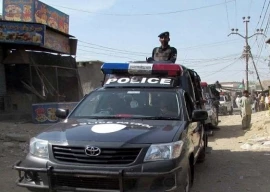
If you are being harassed on the road by someone riding a motorcycle or driving a car, just start pointedly noting down his vehicle’s registration number and he will most likely flee.
This was suggested during a consultative workshop on Friday afternoon on harassment of women in public places and transport. NGOs Legal Rights Forum (LRF), Strengthening Participatory Organisation (SPO) and the Social Research and Development Organisation (SRDO) organised the workshop at the LRF office.
“People stare at us and ask for our mobile numbers and sometime even throw chits of their cellphone numbers at us,” said Shabana, a legal practitioner at the city court who frequently travels by public transport. “This has become a routine.” Shabana, after sharing her experience, added that the seats reserved for women in public buses are a mere 10 per cent of the total capacity and women along with children are pushed into the buses “like animals”.

SRDO’s Muhammad Ashraf said that the organisation conducted a survey on harassment of women in which they interviewed 75 women in three towns of the city. In the survey, 74 per cent of the women said that they don’t complain about harassment to their families because they would then be stopped from going outside.
“A majority of the surveyed women expressed discontent at the remarks passed by the opposite gender in public places, especially buses,” said Ashraf, adding that Nipa Chowrangi is particularly notorious in terms of harassment. “They also complained about the behaviour of bus drivers and conductors and also suggested bringing separate buses for women.”
LRF executive director Advocate Malik Tahir Iqbal suggested that the government should have a strict legislation in place for harassment and should look to implement the existing Women Harassment Act. “Members of the civil society should make committees that visit bus stops where women are frequently harassed,” he suggested. “Those who harass women would feel like they are constantly being monitored. This may also inculcate a sense of responsibility among those who silently watch women being harassed.”
Justice (retd) Majida Rizvi of the Sindh Human Rights Commission of Pakistan said that the existing laws should be made more comprehensive so that violators do not benefit from any weakness or loophole. “Making new laws will just confuse people,” she said. “The existing laws need to be improved. Women need to support each other and parents should teach their children about good manners.”
Published in The Express Tribune, February 2nd, 2014.
COMMENTS (2)
Comments are moderated and generally will be posted if they are on-topic and not abusive.
For more information, please see our Comments FAQ
1728297472-0/Fousey-(1)1728297472-0-405x300.webp)

1730806672-0/diddy-(37)1730806672-0-165x106.webp)
1731748155-0/BeFunky-collage-(8)1731748155-0-165x106.webp)

1731746071-0/Untitled-design-(11)1731746071-0-270x192.webp)
1731749026-0/Copy-of-Untitled-(3)1731749026-0-270x192.webp)

1731737597-0/Untitled-design-(12)1731737597-0-270x192.webp)








Unless the police and rangers are given powers to arrest any male standing in the female section of the bus, female harrassment with continue. The conductor should collect their fare from the females while the bus is standing at the bus stop. Who cares, let the people on the streets go to the dogs, once day these dogs will scavenge the politicians.
I have a better idea, be a man think of the woman being harassed as your sister, daughter, mother and strike the culprit down. This country/ world is better off without such creeps.